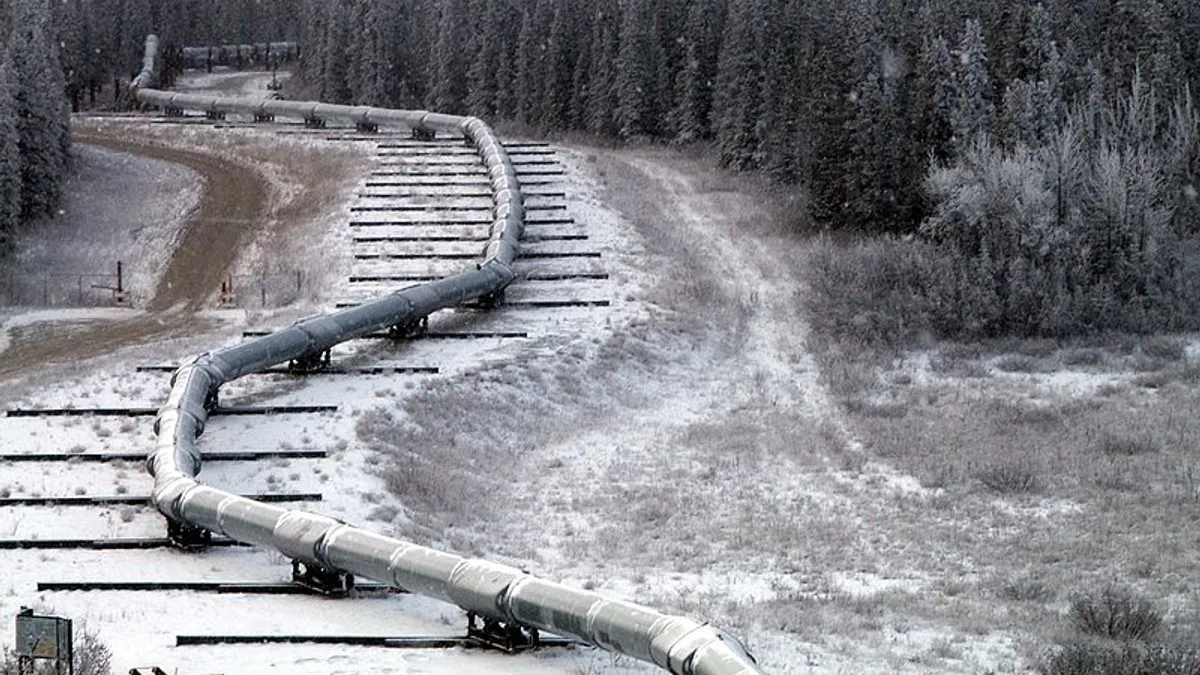Dive Brief:
- The Federal Energy Regulatory Commission on Friday approved the 116-mile PennEast pipeline in a 4-1 vote, writing the benefits it would provide to the market outweigh potential impacts on the environment and local communities.
- Commissioner Richard Glick dissented, questioning the need for the pipeline and noting that the conditional approval grants PennEast eminent domain authority to develop the project. Commissioners Neil Chatterjee and Cheryl LaFleur issued concurring opinions, saying they hope to address landowner and project need concerns in an upcoming pipeline policy review at the agency.
- The FERC approval requires PennEast to meet a series of environmental conditions and the company must still get approval from New Jersey regulators, setting up a potential jurisdictional battle if state officials deny permits as they did in June.
Dive Insight:
After a nearly three-year review process, FERC late on Friday released its order granting a certificate of public convenience and necessity to the PennEast pipeline, which would deliver Pennsylavnia gas to load centers in New Jersey.
In their decision, the FERC majority noted that capacity on the pipeline is already 90% subscribed, indicating market need for the gas transport. The project presents some risks to the environment and landowners, they wrote, but those can be mitigated if PennEast meets a lengthy list of conditions in the order.
"[T]he benefits that the PennEast Project will provide to the market outweigh any adverse effects on existing shippers, other pipelines and their captive customers, and on landowners and surrounding communities," FERC regulators wrote. "[T]he project will result in some adverse environmental impacts, but....these impacts will be reduced to acceptable levels with the implementation of the applicant’s proposed mitigation and staff’s recommendations," their order continued.
Commissioner Glick, in his dissent, argued PennEast had not proved there was a market need for its pipeline because many of the contracts for its capacity were signed with the company's own affiliates.
"PennEast’s affiliates hold more than 75% of the pipeline’s subscribed capacity," Glick wrote. "While I agree that precedent and service agreements are one of several measures for assessing the market demand for a pipeline, contracts among affiliates may be less probative of that need because they are not necessarily the result of an arms-length negotiation."
"By itself, the existence of precedent agreements that are in significant part between the pipeline developer and its affiliates is insufficient to carry the developer’s burden to show that the pipeline is needed," he added.
Glick also noted that while some landowners had prevented PennEast from entering their property to survey for the pipeline, the decision would grant the company federal authority to "exercise eminent domain and condemn land as needed to develop the pipeline."
"In my view, Congress did not intend for the Commission to issue certificates so that certificate holders may use eminent domain to acquire the information needed to determine whether the pipeline is in the public interest," Glick wrote.
Those issues are likely to be central subjects in FERC's upcoming review of its pipeline approval process, announced by Chairman Kevin McIntyre in December. In their concurrences, Chatterjee and LaFleur each noted landowner concerns, but said the mitigation measures and need for the pipeline pushed them to approve.
"Today’s order highlights the issue of how pipeline developers engage with landowners, which I believe should also be explored in the upcoming generic proceeding," LaFleur wrote.
Environmental groups opposed to the pipeline noted that PennEast must still get approvals from the New Jersey Department of Environmental Protection (DEP) and the Delaware River Basin Commission to start construction. In June, the DEP denied water permits to the pipeline, saying it had not provided enough information to the agency. The company said it would resubmit its application to DEP after it won FERC approval.
It remains unclear what action FERC would take if the state denies the permit again. Last September, FERC overruled a New York decision to deny water permits to the Millennial Pipeline, but earlier this month announced it would not overrule a similar permit denial for the Constitution Pipeline, also in New York.
FERC, as a federal agency, has the final say over interstate pipelines, something the commission noted in the final sentences of its lengthy environmental analysis:
"The Commission encourages cooperation between interstate pipelines and local authorities," FERC wrote. "However, this does not mean that state and local agencies, through application of state or local laws, may prohibit or unreasonably delay the construction or operation of facilities approved by this Commission."














